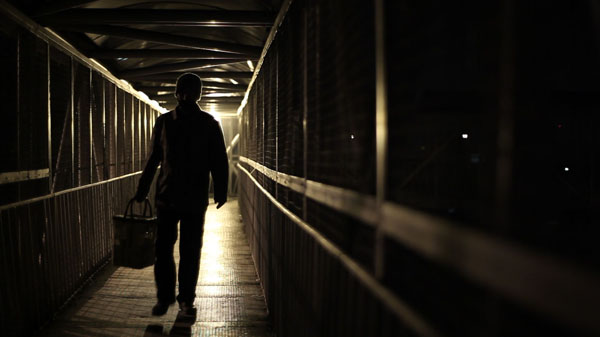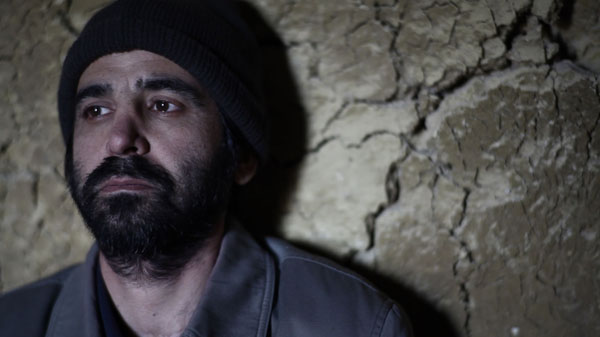“Mohammad Rasoulof returns to Un Certain Regard, two years after Bé Mid 2 Didar (Goodbye), for which he received the Best Director Award.” So begins a rather understated introduction to Manuscripts Must Burn by the Cannes Film Festival’s Béatrice de Mondenard. Goodbye “was brought to the Festival de Cannes secretly, at the same time as Jafar Panahi’s In film nist (This is Not a Film), but the two Iranian filmmakers were unable to come to Cannes. Suspected of preparing a film expressing anti-government sentiment following the contested re-election of Mahmoud Ahmadinejad, they were arrested in March 2010.”
And Rasoulof had not been seen in public since, reports the Independent‘s Kaleem Aftab. Both he and Panahi were sentenced to six years in prison and slapped with a 20-year ban on filmmaking. Following an appeal, Rasoulof’s sentence was reduced to one year, and of course, the ban has stopped neither him nor Panahi, whose Closed Curtain premiered in Berlin in February, from working with whatever resources they can muster under very limited conditions. Aftab notes that Cannes festival director Thierry Frémaux originally announced that Rasoulof “brought us film that he shot clandestinely in Iran and other parts of the world called Anonymous.” But that film disappeared from the official list of festival titles, while another remained, Manuscripts Don’t Burn.
Which, as Mike Davidson reports for Reuters, was met with a standing ovation when it premiered yesterday: “Rasoulof said it was based on the real-life story of 21 Iranian writers and academics traveling on a bus who survived a botched attempt on their lives, which he described as a ‘dark episode’ in the Iranian intellectual community. It focuses particularly on one author secretly writing his memoirs about his time as a political prisoner and the authorities’ attempts to destroy his work. Rasoulof said the film would never be shown in Iran due to its subject matter. He did not seek a permit to shoot it, knowing it would be refused, and struggled to get a cast and crew together…. The film has no credits. ‘We decided collectively to remain anonymous as long as possible as we knew there could be consequences,’ said Rasoulof, who intends to return to Iran shortly.”
“The title borrows a much-quoted line from author Mikhail Bulgakov’s celebrated anti-Soviet satire The Master and Margarita,” notes Stephen Dalton in the Hollywood Reporter. “Which makes sense, because dissidents like Rasoulof and his fellow banned director Jafar Panahi have helped make contemporary Iranian cinema analogous to the films of the latterday USSR, each one forensically decoded by outsiders for their half-buried messages of social critique and political sedition. But there is nothing opaque about Manuscripts Don’t Burn, which bypasses the indirect allegorical style of Rasoulof’s past work to mount a sustained attack on state corruption, violence and censorship in modern-day Iran.”
“I was blown away by what I saw,” writes Barbara Scharres at RogerEbert.com: “the mission for two hit men, Morteza and Khosrow is to retrieve the three existing copies of a draft of a book by an elderly writer who has written a damning account of an attempt by the government to kill a busload of writers in transit to a conference by means of a rigged accident. The two thugs are directed by a secret service agent who had once been the cellmate of the poet who has hidden one of the manuscripts. Changing regimes, shifting government agendas, and changing sides are all masterfully underlined with a story so low-key in its narration that the increasingly horrendous incidents and escalating violence against the writers being pursued is portrayed even-handedly as just another humdrum day’s work by the hired killers.”
“A brave, challenging picture that makes the viewer complicit in the action, it is also perhaps the first film since the declaration of the Islamic Republic to confront so directly the brutality of the feared security apparatus,” writes Alissa Simon in Variety. “No warm tones intrude on the well-executed lensing, much of which is done in tightly framed closeups. The claustrophobic visuals, as well as the sophisticated and increasingly ominous sound design, reinforce a ‘no exit’ feel. Those in the know say all exteriors were shot in Iran, while the interior scenes were filmed in Germany.”
“While the film’s political content is incendiary stuff,” writes Jonathan Romney in Screen, “it loses its charge somewhat in the communication. The confusing narrative builds up too slowly, front-loading the film with laborious exposition and prolix discussions between the writers about the pros and cons of publishing their work published online, and about the perceived lack of political commitment in Iranian youth (the three writer characters are all elderly). There’s also an off-puttingly two-dimensional performance by the actor playing the editor, so icy and smooth he could almost be a Bond villain. Still, artistic shortcomings take second place to the fact that making this film is itself an audacious and dangerous act.
Last week, Screen‘s Melanie Goodfellow reported that Paris-based Elle Driver has picked up international sales.
Updates: “Unaccountably not included in the Cannes competition, where it surely would have earned a citation for its skill and daring, Manuscripts Don’t Burn moves at a stately pace that cannot hide the urgency of its theme or the peril its cast and crew faced in making it,” writes Mary Corliss for Time. “Beyond the death-defying audacity of his enterprise, Rasoulof has created a killer-thriller that is all the more harrowing because the whole sorry story is true.”
The International Federation of Film Critics (FIPRESCI), presenting an award each year to one film in Competition, one film in Un Certain Regard, and one in the Directors’ Fortnight, has singled out Blue Is the Warmest Color, Manuscripts Don’t Burn, and Blue Ruin. John Hopewell has more in Variety.
Update, 5/26: In Film Comment‘s second Cannes roundtable, Jonathan Romney calls Manuscripts “the most explicit statement yet about what is being done to intellectuals and dissidents in Iran, and to an extent to Rasoulof himself… But in fact, you also have to take into account that it’s really not a very good film.” Gavin Smith: “Yeah, it’s kind of deadly.” Romney: “It’s like a Costa-Gavras film like L’Aveu, but Costa-Gavras at his most leaden. And it’s a real shame. If that had been a really narratively tight film it would have been incendiary. As it is, you think, well gosh that’s a great news story.” Marco Grosoli: “It’s undaring precisely because it’s explicit.”
Cannes 2013 Index. And you can watch over 100 films that have seen their premieres in Cannes right here on Fandor. For news and tips throughout the day every day, follow @KeyframeDaily on Twitter and/or the RSS feed. Get Keyframe Daily in your inbox by signing in at fandor.com/daily.





